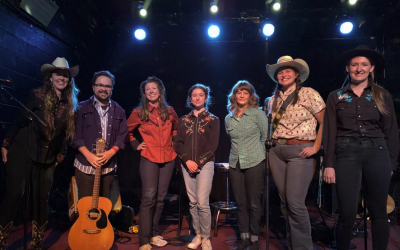Dr. Kristina Jacobsen, Assistant Professor of Ethnomusicology in the UNM Department of Music, is awarded the 2018 Woody Guthrie Book Award for the most outstanding book in popular music by the International Association for the Study of Popular Music (IASPM-U.S.).
“Jacobsen’s study of the ways in which Diné, or Navajo, country music musicians and fans articulate their sense of belonging and identity through country music, a genre deemed incongruous with and even antagonistic to Navajo sensibilities, is a remarkable example of popular music scholarship. Jacobsen’s work is particularly timely as the racialization of indigeneity continues to erase indigenous presence from popular music and cultural production writ large. Jacobsen’s reflexive positioning as a non-Diné (white) scholar as well as a performing country musician in bands with Navajo musicians, Jacobsen provides a strong model for ethical and sensitive ethnographic work.”
2019 Prize Committee (Kevin Fellezs, Alexa Woloshyn, and Kate Galloway), Woody Guthrie Book Award.
AMITY TRIO RELEASES DEBUT ALBUM
“BETWEEN US NOW”
AMITY TRIO RELEASES DEBUT ALBUM“BETWEEN US NOW” Bloomington, IN: The Amity Trio is releasing their debut album, “Between Us Now”. The album features North American composers Amy Beach, Dr. Lauren Bernofsky, Dr. Alice Jones, Dr. Carrie Magin, Florence Price, and Nur...
KUNM’s ‘ear to the ground’ podcast featured UNM Honky Tonk Ensemble
KUNM - Ear To The Ground is broadcast on Saturdays 7:00 PM - 8:00 PM. Hosted by Matthew Finch. Is a local music showcase, featuring live performances by local talent. The UNM Honky Tonk Ensemble was featured in December. Listen here. Class co-facilitators: Dr....
Dr. Maxine Thévenot selected to participate in the Jeanne Demessieux Centennial Tribute
Dr. Maxine Thévenot, Instructor of Organ, here at the UNM Department of Music, was one of 14 women organists selected to participate in the Jeanne Demessieux Centennial Tribute. To commemorate the virtuoso French organist, Jeanne Demissieux. Dr. Thévenot was selected...




